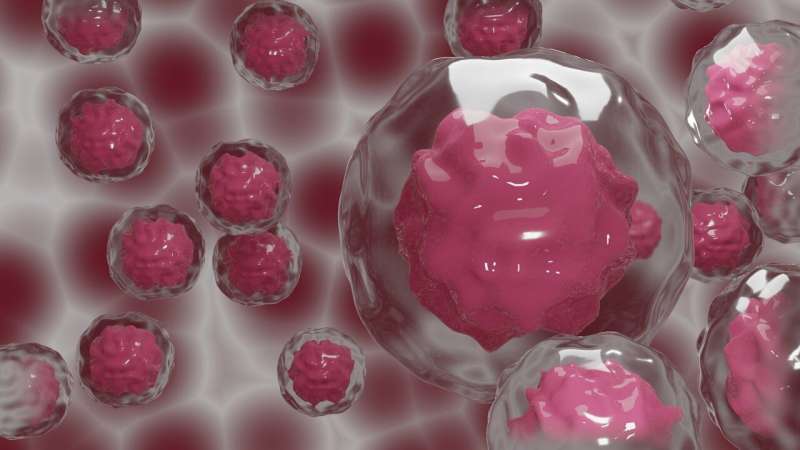This article has been reviewed according to Science X's editorial process and policies. Editors have highlighted the following attributes while ensuring the content's credibility:
fact-checked
peer-reviewed publication
trusted source
proofread
Alternative glucose breakdown ensures the survival of cancer cells

A key enzyme in sugar metabolism is inactivated particularly easily and efficiently by oxidative stress. Scientists at the German Cancer Research Center (Deutsches Krebsforschungszentrum, DKFZ) have now shown that with this oxidation, cells switch to an alternative sugar breakdown pathway and can thus escape oxidative stress. Cancer cells in particular benefit from this mechanism, which can also protect them from therapy-related damage.
One of the central enzymes in sugar breakdown, GAPDH (glyceraldehyde-3-phosphate dehydrogenase), has a special characteristic: it is oxidized unusually quickly and efficiently by hydrogen peroxide (H2O2) and is inactivated in the process. This causes the energy-providing glucose breakdown in the cells to come to a halt.
"In yeast cells, we have already shown that oxidative inactivation of GAPDH redirects sugar breakdown to another metabolic pathway, which ensures that the yeasts can better tolerate oxidative stress. We have now investigated whether this also applies to mammalian cells," says Tobias Dick of the German Cancer Research Center.
As a prerequisite for the functional analysis, the researchers used a GAPDH mutant that is oxidation-resistant but otherwise performs its function in sugar breakdown quite normally. Using the CRISPR-Cas gene scissors, they replaced the normal GAPDH with the oxidation-resistant mutant, both in cell lines and in mice.
Using this approach, the team showed that oxidation of GAPDH also allows mammalian cells to switch from energy-providing sugar breakdown to the so-called pentose phosphate pathway. This metabolic pathway does not yield energy tot he cell, but it does provide the reducing molecule NADPH, which can be used to neutralize harmful oxidants.
Tumor cells in particular are exposed to increased oxidative stress in many phases of their development. This is true, for example, when the nutrient supply fluctuates, or when individual cells detach from the tumor mass and enter the bloodstream. How do cancer cells cope with an oxidation-resistant GAPDH? GAPDH-mutated cancer cells transplanted to mice grew into tumors significantly slower than cancer cells with normal GAPDH. The mutant cancer cells showed increased oxidative stress and died more frequently. This was actually due to their inability to activate the pentose phosphate pathway, as shown by a measurement of metabolites in the tumor.
As expected, when the team treated the tumor-bearing mice with chemotherapy and radiotherapy, which further increases oxidative stress in tumor cells, there was a synergistic effect, meaning the therapy had a significantly greater effect on GAPDH-mutated cancer cells.
"Oxidative stress is one of the most important barriers to the proliferation and spread of tumor cells in the body. Cancer cells are therefore particularly dependent on strategies to cope with this situation," explains Tobias Dick. "One of these strategies is apparently the oxidation of GAPDH, which boosts the pentose phosphate pathway and thus protects the cells from oxidative damage with NADPH. With this fast-acting oxidative protection, cancer cells may buy themselves valuable time until other, slower adaptation mechanisms take effect."
The study is published in the journal Nature Metabolism.
More information: Tobias Dick, The GAPDH redox switch safeguards reductive capacity and enables survival of stressed tumour cells, Nature Metabolism (2023). DOI: 10.1038/s42255-023-00781-3. www.nature.com/articles/s42255-023-00781-3

















